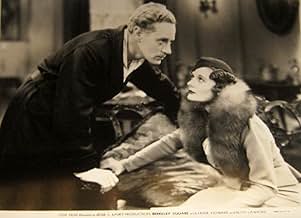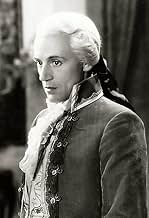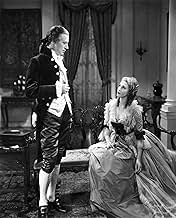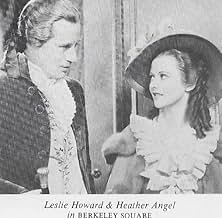A young American man comes to believe that he can will himself back to London in the time of the American Revolution and meet his ancestors, who lived in the house he has just inherited.A young American man comes to believe that he can will himself back to London in the time of the American Revolution and meet his ancestors, who lived in the house he has just inherited.A young American man comes to believe that he can will himself back to London in the time of the American Revolution and meet his ancestors, who lived in the house he has just inherited.
- Nominated for 1 Oscar
- 4 wins & 2 nominations total
Samuel S. Hinds
- The American Ambassador
- (as Samuel Hinds)
Lionel Belmore
- Innkeeper
- (uncredited)
Tom Ricketts
- Town Crier
- (uncredited)
Hylda Tyson
- Maid
- (uncredited)
Featured reviews
In adapting his own stage play 'Berkeley Square' for the screen, playwright John L Balderston made numerous changes. One change is significant in hindsight: during Act One of the stage play, the dialogue makes several references to a war hero named Bill Clinton! (A hero on the side fighting AGAINST the United States.) In the film, this British officer is merely identified as Major Clinton, and there are no mentions of his heroics.
Leslie Howard, everyone's definitive Englishman, was actually English only by a fluke: his parents were Hungarian Jews who moved to London shortly before his birth. In the film version of 'Berkeley Square', Howard portrays two Americans -- one from the 18th century, one from the present -- but his accent and demeanour in both roles are quintessentially English. Howard had previously starred on Broadway in this story, but in the stage play he portrayed only the modern-day Peter Standish who journeys into the past; his namesake ancestor (swapping places with him in the present) remained offstage.
Here we have the fantasy about a modern American who contrives to switch places in time with his 18th-century ancestor: both men are named Peter Standish, and are physically identical. (This is unlikely: the medical, dental and nutritional standards in 1784 would have kept that century's Standish looking very different from his descendant.) Apart from failing to convince me that he's American, Howard gives an excellent performance in both roles. Soon enough, Peter Standish acquires a touch of Peter Ibbetson as he falls in love with a woman who will die in 1787, more than a century before his own birth.
The ever-reliable Samuel S. Hinds (wearing a bizarre moustache here) plays straight man to Howard in one fascinating scene, in which Standish explains the difference between linear time and non-linear time: in the latter, all the events in the universe are occurring simultaneously.
Also quite excellent is Betty Lawford in an unsympathetic role. She wears some very chic gloves but also sports a bizarre fur collar that seems to be intended for a female impersonator. A transvestite linebacker could hide his shoulders inside there!
As the doomed young lady of 18th-century England, Heather Angel has one memorable scene opposite the 18th-century Standish's body possessed by his modern descendant. Staring into Standish's eyes, she glimpses an amazing stock-footage montage of the chaos and mayhem of modern times. Her reaction is memorable.
A story like this will have intentional anachronisms, but I looked for unintentional errors. Here's one: a string ensemble in 1784 perform Gossec's 'Gavotte' two years before he wrote it. Have another: in the opening scene, set in September 1784, Lionel Belmore reports that a French aeronaut has just flown from Dover to Calais (Belmore mispronounces this name) in a balloon. Actually, that didn't happen until January 1785: the flight was in the opposite direction, and there were two men (one of them Anglo-American) in the balloon. In a later scene, some English gentlemen give the word 'bathed' the wrong pronunciation (yes, I'm quite certain). The art direction is generally excellent, except for a dodgy thunderstorm. And it's weird to encounter the term 'crux ansata' applied to what modern viewers know better as the Egyptian ankh.
This film gets very much right a detail that many other period stories get wrong: 'Berkeley Square' acknowledges that the past is a dirtier, not cleaner, place than the present.
The single worst thing about 'Berkeley Square' is the overscored soundtrack: practically every scene assaults the ears with loud background music, when so much of this gentle fantasy would have worked better with no music at all. I was delighted that the character actress Beryl Mercer is much less annoying than usual here, probably because (for once) she's been given no maudlin material. My rating for this gentle, stately fantasy is 7 out of 10. For a much more romantic treatment of this premise with a different set of time-travel paradoxes, I recommend a better movie: 'Somewhere in Time'.
Leslie Howard, everyone's definitive Englishman, was actually English only by a fluke: his parents were Hungarian Jews who moved to London shortly before his birth. In the film version of 'Berkeley Square', Howard portrays two Americans -- one from the 18th century, one from the present -- but his accent and demeanour in both roles are quintessentially English. Howard had previously starred on Broadway in this story, but in the stage play he portrayed only the modern-day Peter Standish who journeys into the past; his namesake ancestor (swapping places with him in the present) remained offstage.
Here we have the fantasy about a modern American who contrives to switch places in time with his 18th-century ancestor: both men are named Peter Standish, and are physically identical. (This is unlikely: the medical, dental and nutritional standards in 1784 would have kept that century's Standish looking very different from his descendant.) Apart from failing to convince me that he's American, Howard gives an excellent performance in both roles. Soon enough, Peter Standish acquires a touch of Peter Ibbetson as he falls in love with a woman who will die in 1787, more than a century before his own birth.
The ever-reliable Samuel S. Hinds (wearing a bizarre moustache here) plays straight man to Howard in one fascinating scene, in which Standish explains the difference between linear time and non-linear time: in the latter, all the events in the universe are occurring simultaneously.
Also quite excellent is Betty Lawford in an unsympathetic role. She wears some very chic gloves but also sports a bizarre fur collar that seems to be intended for a female impersonator. A transvestite linebacker could hide his shoulders inside there!
As the doomed young lady of 18th-century England, Heather Angel has one memorable scene opposite the 18th-century Standish's body possessed by his modern descendant. Staring into Standish's eyes, she glimpses an amazing stock-footage montage of the chaos and mayhem of modern times. Her reaction is memorable.
A story like this will have intentional anachronisms, but I looked for unintentional errors. Here's one: a string ensemble in 1784 perform Gossec's 'Gavotte' two years before he wrote it. Have another: in the opening scene, set in September 1784, Lionel Belmore reports that a French aeronaut has just flown from Dover to Calais (Belmore mispronounces this name) in a balloon. Actually, that didn't happen until January 1785: the flight was in the opposite direction, and there were two men (one of them Anglo-American) in the balloon. In a later scene, some English gentlemen give the word 'bathed' the wrong pronunciation (yes, I'm quite certain). The art direction is generally excellent, except for a dodgy thunderstorm. And it's weird to encounter the term 'crux ansata' applied to what modern viewers know better as the Egyptian ankh.
This film gets very much right a detail that many other period stories get wrong: 'Berkeley Square' acknowledges that the past is a dirtier, not cleaner, place than the present.
The single worst thing about 'Berkeley Square' is the overscored soundtrack: practically every scene assaults the ears with loud background music, when so much of this gentle fantasy would have worked better with no music at all. I was delighted that the character actress Beryl Mercer is much less annoying than usual here, probably because (for once) she's been given no maudlin material. My rating for this gentle, stately fantasy is 7 out of 10. For a much more romantic treatment of this premise with a different set of time-travel paradoxes, I recommend a better movie: 'Somewhere in Time'.
BERKELEY SQUARE was a success d'estime of the late Twenties and early Thirties. Based on a short story - THE SENSE OF THE PAST - by Henry James, it tells the story of how Peter Standish (Leslie Howard) travels back in time from the contemporary world into the late eighteenth century, and discovers to his cost that life isn't quite as idyllic as the history books might suggest. John L. Balderston's script isn't without its sentimental moments, but generally takes a hard-nosed look at the ways in which individuals remain as self-centered in the past as they might have been over a century ago. Leslie Howard, who created the past of Standish on the Broadway stage, here recreates his part; he doesn't have to do much other than to look bewildered, which he achieves very competently. Valerie Taylor makes an ideal romantic interest. Director Frank Lloyd was one of Twentieth Century-Fox's most competent contract directors; his version of Noel Coward's CAVALCADE (1933), based on another theatrical hit, is particularly memorable. In BERKELEY SQUARE he creates a brisk narrative, containing a memorable series of transitions between past and present. Definitely worth a look if a copy of the film can be found.
Leslie Howard received his first Oscar nomination in this lovely film adaptation of the play he starred in in London and on Broadway. He plays a current-day (1933) American man who yearns for the peace and quiet and beauty of the 18th century after he discovers some old papers and diaries in his ancestral house. He wishes so hard he is actually transported to 1784.
Right off the bat, he gets into trouble fitting into the rhythm and manners of 18th Century London ... and into the lives of his ancestors. The mother (Irene Browne) is trying to marry off two daughters (Heather Angel, Valerie Taylor) to men with money, one of whom is Howard's ancestor whose body he is now inhabiting.
Knowing that he must not change history, he walks a tightrope. He is not attracted to the woman his ancestor marries, but he is attracted to her sister. But history dictates he must not marry her. He also keeps dropping words and phrases that make no sense in 1784, and he scares people by when he blurts out bits of information about things that have not yet happened.
As he digs himself into a bigger hole every day, he realizes that the woman he really loves (Angel) seems to shares his discontent for the age in which she is trapped. She longs for the future! Yet in one horrific moment, she sees the future world in his eyes and it scares her. For his part, he finally has to admit that the 18th Century is utterly horrible and that it actually stinks! People don't bathe; the streets are full of horse manure.
Leslie Howard is superb as the man torn between the past and his own time. He and Heather Angel make for a terrifically doomed couple, and the scene when he returns (in 1933) from her grave and read the epitaph carved into her headstone is quite moving.
Co-stars include Juliette Compton as an arch and wily duchess, Alan Mowbray as Clinton, Ferdinand Gottschalk as the aged suitor, Betty Lawford as the current-day girlfriend, Beryl Mercer as the housekeeper, and Samuel S. Hinds as Adams.
Right off the bat, he gets into trouble fitting into the rhythm and manners of 18th Century London ... and into the lives of his ancestors. The mother (Irene Browne) is trying to marry off two daughters (Heather Angel, Valerie Taylor) to men with money, one of whom is Howard's ancestor whose body he is now inhabiting.
Knowing that he must not change history, he walks a tightrope. He is not attracted to the woman his ancestor marries, but he is attracted to her sister. But history dictates he must not marry her. He also keeps dropping words and phrases that make no sense in 1784, and he scares people by when he blurts out bits of information about things that have not yet happened.
As he digs himself into a bigger hole every day, he realizes that the woman he really loves (Angel) seems to shares his discontent for the age in which she is trapped. She longs for the future! Yet in one horrific moment, she sees the future world in his eyes and it scares her. For his part, he finally has to admit that the 18th Century is utterly horrible and that it actually stinks! People don't bathe; the streets are full of horse manure.
Leslie Howard is superb as the man torn between the past and his own time. He and Heather Angel make for a terrifically doomed couple, and the scene when he returns (in 1933) from her grave and read the epitaph carved into her headstone is quite moving.
Co-stars include Juliette Compton as an arch and wily duchess, Alan Mowbray as Clinton, Ferdinand Gottschalk as the aged suitor, Betty Lawford as the current-day girlfriend, Beryl Mercer as the housekeeper, and Samuel S. Hinds as Adams.
Leslie Howard proves once again that he was the matinée idol women adored long before he was unwillingly cast as Ashley Wilkes in "Gone with the Wind," a role he hated to play.
He gives a very forceful performance here as a young man who is fascinated by his ancestry and somehow transports himself to an earlier era, with unhappy consequences he couldn't have expected when events turn against him.
Heather Angel makes a good impression (she and Howard both starred in the Broadway stage version), but the tale itself is much too talky for the screen and would have benefited from a wider use of outdoor scenes to take away some of the stage-bound feeling. An unusual feature is the almost constant flow of background music in an era when most soundtracks were only punctuated by dialog without musical effects. This affects the quality of the spoken words, of which there are far too many for my taste and, in this case, because it's based on a stage play taken from an unfinished Henry James novel called "A Sense of Time." It takes a willingness to suspend disbelief in order to enjoy the fantasy aspects of the story, but it's done in an interesting way and directed in stylish fashion by Frank Lloyd.
Summing up: One of Howard's better film performances, he was nominated for a Best Actor Oscar. Remade by Fox in 1951 as a film for Tyrone Power and Ann Blyth called "I'll Never Forget You."
He gives a very forceful performance here as a young man who is fascinated by his ancestry and somehow transports himself to an earlier era, with unhappy consequences he couldn't have expected when events turn against him.
Heather Angel makes a good impression (she and Howard both starred in the Broadway stage version), but the tale itself is much too talky for the screen and would have benefited from a wider use of outdoor scenes to take away some of the stage-bound feeling. An unusual feature is the almost constant flow of background music in an era when most soundtracks were only punctuated by dialog without musical effects. This affects the quality of the spoken words, of which there are far too many for my taste and, in this case, because it's based on a stage play taken from an unfinished Henry James novel called "A Sense of Time." It takes a willingness to suspend disbelief in order to enjoy the fantasy aspects of the story, but it's done in an interesting way and directed in stylish fashion by Frank Lloyd.
Summing up: One of Howard's better film performances, he was nominated for a Best Actor Oscar. Remade by Fox in 1951 as a film for Tyrone Power and Ann Blyth called "I'll Never Forget You."
"Berkeley Square" is similar in theme to Jack Finney's "Time and Again." A present day American is transported back to the home of his ancestors in London, during the American Revolution. He knows, of course, what will hap- pen and even falls in love with one of his female ancestors. An old film but a terrific one, with Leslie Howard and Heather Angel.
Did you know
- TriviaS.T. Joshi points to this film as an inspiration for H.P. Lovecraft's novel "The Shadow Out of Time": "Lovecraft saw this film four times in late 1933; its portrayal of a man of the 20th century who somehow merges his personality with that of his 18th-century ancestor was clearly something that fired Lovecraft's imagination, since he had written a story on this very theme himself--the then unpublished "The Case of Charles Dexter Ward" (1927)." Lovecraft called the film "the most weirdly perfect embodiment of my own moods and pseudo-memories that I have ever seen--for all my life I have felt as if I might wake up out of this dream of an idiotic Victorian age and insane jazz age into the sane reality of 1760 or 1770 or 1780." Lovecraft noted some conceptual problems in this film's depiction of time travel, and felt that he had "eliminated these flaws in his masterful novella of mind-exchange over time."
- GoofsThe word Okay (OK) was not used in the 18th century.
- Quotes
Tom Pettigrew: [to his sister, after being caught kissing the maid] You all look alike in the dark.
- ConnectionsReferenced in Don't Bet on Blondes (1935)
- SoundtracksEarly One Morning
(uncredited)
English folk song
- How long is Berkeley Square?Powered by Alexa
Details
- Release date
- Country of origin
- Language
- Also known as
- La plaza de Berkeley
- Production company
- See more company credits at IMDbPro
- Runtime
- 1h 28m(88 min)
- Color
- Aspect ratio
- 1.37 : 1
Contribute to this page
Suggest an edit or add missing content

































